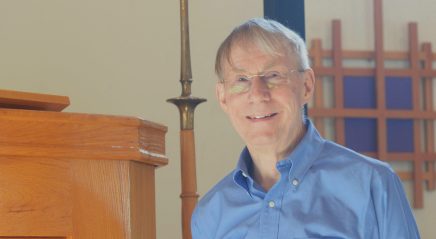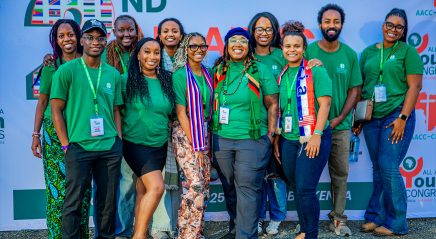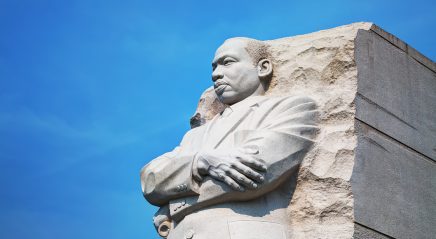Para celebrar el Mes de la Herencia Hispana, del 15 de septiembre al 15 de octubre estamos hablando con luteranos de ascendencia latiné para amplificar las voces de nuestros hermanos en Cristo. Hoy estamos hablando con Rev. Alejandro Mejía, Presidente de la Asociación de Ministerios Latinos de la ELCA y quién a su vez sirve como asistente del obispo & director de misiones del Sínodo de Delaware-Maryland.
Las respuestas han sido editadas para su publicación.
¿Cómo está usted conectado a la ELCA?
Nací y crecí en Colombia, América del Sur. Mi familia siempre ha pertenecido a la iglesia luterana. Recuerdo estar presente en conversaciones en las que se mencionaba el nombre “ELCA”. Cuando me hice más activo en la iglesia, aprendí sobre los fuertes lazos que hay entre la Iglesia Evangélica Luterana de Colombia y la ELCA. Recuerdo haber visto o escuchado de líderes como Mary Campbell, Rafael Malpica Padilla, por mencionar a algunos que son conocidos y que todavía están entre nosotros. Tiempo después, cuando ya servía a una congregación, me llegó una invitación del Sínodo de Carolina del Sur de la ELCA en los Estados Unidos para servir como desarrollador de misiones entre la creciente comunidad latina.
Adicionalmente a mi trabajo como desarrollador de mision, también he sido invitado a ser parte de iniciativas e importantes eventos para la vida de la iglesia tales como: ELCA Glocal Musicians, ELCA Youth Gathering, ELCA Rostered Ministers Gathering, ELCA Latino Strategy, entre otros. Actualmente sirvo como asistente del obispo y director de misión evangelica del Sinodo de Delaware-Maryland, también como senior pastor interino de Lutheran Church of the Good Shepherd, Bel Air, MD, y cómo Presidente de la Asociación de Ministerios Latinos de ELCA. Ha sido un honor y bendición poder servir la Iglesia que amo en diferentes formas y capacidades.
Todo eso es para decir que la ELCA siempre fue parte de mi jornada de fe, gracias a su asociación con la iglesia en Colombia. Por supuesto que nuestra conexión se ha vuelto directa y más fuerte desde que me mudé a este país.
¿Cómo cree que la ELCA puede amplificar mejor las voces latinés?
Creo que, juntando las caras con las historias, explicando los puntos fuertes de nuestra gente. Debemos fomentar atención y empatía en nuestra iglesia hacia las necesidades y realidades de nuestros hermanos latinés, pero también es necesario que publiquemos historias sobre las habilidades, los puntos fuertes, el poder que existe entre nuestra gente. Somos luchadores; nunca nos echamos para atrás. Eso es algo que hay que mencionar. Por supuesto, aún hay tantas necesidades por satisfacer. Sin embargo, hay tanto que podemos ofrecer para hacer más fuerte a nuestra denominación. Así como contribuimos a la grandeza de este país, también podemos hacerlo en nuestra denominación.
¿En qué formas puede la ELCA ser más inclusiva de la comunidad latiné?
Es importante abrir espacios en la mesa de toma de decisiones donde se sientan los poderosos. Pero no se trata de traer a una persona latiné porque existe la necesidad de cierta diversidad. Se trata de traer suficientes personas de una comunidad en particular, en este caso la comunidad latiné, para que haya una voz más fuerte y asertiva. Para una persona de color es intimidante estar en la mesa con probablemente otras dos o tres, pero en la que todavía somos una minoría.
También es importante tener presente que América Latina está formada por varios países, cada uno con tantas culturas diferentes que nos hacen únicos. Los líderes de nuestra iglesia deben confiar en nosotros, escucharnos, y aprender con nosotros y de nosotros. Podemos prosperar si lo hacemos juntos.
Es esencial ser conscientes de nuestra presencia proporcionando formas en las que podemos sentir que pertenecemos. No porque necesitemos ayuda, sino como iguales. Un ejemplo de ese enfoque podría ser ofrecer interpretación simultánea al español en reuniones como la asamblea de toda la iglesia, entre otros espacios importantes para nuestra vida como iglesia; poniendo a disposición material de adoración, de formación en la fe —por mencionar unos cuantos— en español, escrito por líderes latinés.
Necesitamos más y más líderes latinés listos para servir; por lo tanto, debemos crear formas de capacitar y equipar a las personas de nuestras comunidades facilitando el acceso a la educación. Y no solo seminarios; hay otras profesiones que se necesitan dentro de nuestra iglesia que pueden funcionar por el bien de nuestra comunidad latiné.
Hay muchas oportunidades y maneras que nuestra iglesia podría implementar para poner en práctica el hecho de que todos son bienvenidos, con el fin de que podamos sentir en nuestros cuerpos que, en efecto, somos vistos y apreciados.
¿Cómo ve a la comunidad latiné representada en su sínodo e iglesias locales?
Soy muy afortunado de trabajar con el obispo William Gohl. Él me ha dado la oportunidad de ocupar una posición de liderazgo dentro de nuestro sínodo. Me encantaría ver que esto sucediera en otros sínodos. Me encantaría ver a más ministros latinés en la lista como pastores principales o como diáconos a cargo de programas sólidos dentro de congregaciones y sínodos. Directores juveniles, directores musicales.
¿Qué le da esperanza?
Hay comunidades y ministros en la lista que, a pesar de los retos (inequidad, falta de recursos, racismo), se despiertan cada mañana para trabajar duro y prosperar. Ellos y sus comunidades están marcando una gran diferencia en esta iglesia y esta nación. Tengo esperanza al ver a niños y jóvenes diciendo que aman a la iglesia, y se identifican como cristianos luteranos.
Sé de familias que se suben al automóvil y conducen varias millas solo por la oportunidad de reunirse en torno a la palabra y el sacramento porque sienten que pertenecen. Madres que vienen con sus hijos porque necesitan ser nutridas por el amor de Dios hecho realidad a través de la comunidad. Dios nos ha inspirado a seguir adelante, a nunca echar para atrás, sino a levantarnos si caemos. Y nos levantamos más fuertes, porque no estamos solos.
¿Por qué cosas ora usted?
El fin de la mentalidad patriarcal, de supremacía blanca y despreciativa con la que muchos están acostumbrados a mirarnos. Oro por oportunidades para que nuestras nuevas generaciones sean quienes son, que promovamos el bilingüismo, que fomentemos el aprendizaje de otros idiomas, que nuestras iglesias sean espacios seguros, no para asimilar la cultura dominante, sino para afirmar que la diversidad es uno de los dones más preciosos de Dios y la esencia de Dios.
___________
ENGLISH TRANSLATION
In celebration of Hispanic Heritage Month, from Sept. 15 to Oct. 15 we are speaking with Lutherans of Latiné descent to amplify voices of our siblings in Christ. Today we are speaking with Rev. Alejandro Mejia, President of the ELCA Latino Ministries Association who also serves as assistant to the bishop & director for evangelical mission of the Delaware-Maryland Synod.
Responses have been edited for publication.
How are you connected to the ELCA?
I was born and raised in Colombia, South America. My family has always belonged to the Lutheran church. I remember being present at conversations in which the name “ELCA” would be mentioned. When I became more active in the church, I learned about the strong ties between the Iglesia Evangelica Luterana de Colombia and the ELCA. I remember seeing or hearing about leaders such as Mary Campbell, Rafael Malpica Padilla, just to mention some who are well-known and still among us. Later, when I was already serving a congregation, an invitation came from the ELCA South Carolina Synod in the United States to serve among the growing Latino community as a mission developer.
In addition to my work as mission developer, I have also been invited to be part of initiatives and important events for the life of our church such as ELCA Glocal Musicians, ELCA Youth Gathering, ELCA Rostered Ministers Gathering, initiatives like the ELCA Latino Strategy, just to mention some. Currently, I am serving as assistant to the bishop & director for evangelical mission of the Delaware-Maryland Synod, interim senior pastor at the Lutheran Church of the Good Shepherd, Bel Air, MD, and as President of the ELCA Latino Ministries Association. It has been an honored and a blessing to be able to serve the church I love in this capacities.
All of that is to say, the ELCA was always part of my faith journey, thanks to its partnership with the church in Colombia. Of course, our connection has become direct and stronger since I moved to this country.
How do you believe the ELCA can better amplify Latiné voices?
I think putting faces and stories together, explaining the strengths that our people have. We need to promote mindfulness and empathy among our church toward the needs and realities of our Latiné siblings, but we also need to put stories out there about the abilities, the strengths, the power that exists within our people. We are fighters; we never step back. That is something that has to be mentioned. Of course, there are so many needs still to be satisfied. However, there is so much that we can offer to make our denomination a stronger one. As we are contributing to the greatness of this country, we are also able to do it within our denomination.
What are ways in which the ELCA can be more inclusive for the Latiné community?
It is important to open spaces at the decision-making table where the powerful sit. But it is not about bringing a Latiné person because there is the need for some diversity. It is about bringing enough people from a particular community, in this case the Latiné community, in order that there is a stronger and assertive voice. It is intimidating for one person of color being at the table with probably another two or three but where, still, we are a minority.
It is also important to keep in mind that the Latino America is made of several countries, each having so many different cultures that make us unique. Leaders from our church need to trust us, listen, and learn with us and from us. We can thrive if we do it together.
Being mindful of our presence by providing ways in which we can feel we belong is essential. Not because we need help, but as equals. One example of that approach could be offering simultaneous interpretation to Spanish at gatherings such as a churchwide assembly, among other important spaces for our life as a church; making available worship, faith formation material—just to mention a few—in Spanish, written by Latiné leaders.
We need more and more Latiné leaders ready to serve; therefore, we need to create ways to train and equip people from our communities by facilitating access to education. And not only seminaries—there are other professions that are needed within our church that can work for the sake of our Latiné community.
There are many opportunities and ways that our church could implement in order to put into practice the fact that all are welcome, so that we can feel in our bodies that we are indeed seen and appreciated.
How do you see the Latiné community represented in your synod/local churches?
I am so fortunate to work with Bishop William Gohl. He has given me the opportunity to occupy a position of leadership within our synod. I would love to see this happening in other synods. I would love to see more Latiné rostered ministers as senior pastors or as deacons in charge of strong programs within congregations and synods. Youth directors, music directors.
What gives you hope?
There are communities and rostered ministers who, despite the challenges—inequity, lack of resources, racism—wake up every morning to work hard and thrive. They and their communities are making a huge difference in this church and nation. I have hope by seeing children and youth saying that they love the church, identifying as Christians Lutherans.
I know about families who get in the car and drive several miles just for the opportunity to gather around word and sacrament because they feel they belong. Single mothers coming with their children because they need to be nurtured by God’s love made real through community. God has inspired us to move forward, to never step back, but rather to rise if we fall. And we rise stronger, because we are not alone.
What do you pray for?
The end of the patriarchal, white supremacist, patronizing mindset from where many are used to looking at us. I pray for opportunities for our new generations to be who they are, that we promote bilingualism, that we encourage learning other languages, that our churches are safe spaces not to assimilate the dominant culture but by affirming that diversity is one of God’s most precious gifts and God’s essence.









